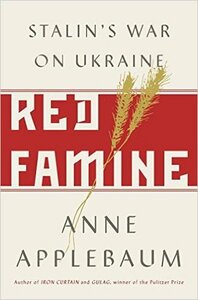Take a photo of a barcode or cover
challenging
dark
informative
reflective
sad
tense
slow-paced
If you look at Eastern Europe today in late 2022 and wonder "how did we get here?". Read this book. Read this, and learn how and why millions starved to death without the world ever knowing with certainty for decades.
challenging
dark
informative
reflective
tense
slow-paced
Anne Applebaum’s nonfiction writing is absolutely fascinating. So enticing and interesting always!
An incredible piece of history that is poorly understood in the West. Beyond a detailed accounting of the Holodomor itself, Applebaum provides both the historical context for the tragedy and layers in the impacts the famine had on Ukrainian history through World War II and the Holocaust, the Cold War up through the Maidan and today. Vital history well told. A great read.
I am giving it five stars because it’s an amazing book on another horrible moment in mankind’s history. It’s just unthinkable this happened but then I remembered this is happening again and again. In other countries than Ukraine. If the history you are reading does not make you uncomfortable, it’s not history.
challenging
dark
informative
reflective
sad
medium-paced
Book Riot Read Harder 2022 Challenge #22: Read a history about a period you know little about.
challenging
dark
emotional
informative
reflective
sad
medium-paced
Where others have summarized this marvellous book detailing the genocide perpetrated on Ukraine by Stalin and his henchmen, I will take a sidebar into things as they stand today.
The Soviet Union is no more. Its apologists are no more, we think.
But an equally diabolical regime in China has decided that millions of Muslims within its borders require “reeducation” and this same regime has:
1) Among the most sophisticated systems of electronic surveillance imaginable;
2) Access to personal information unimaginable even a few years ago such that it is poised to leapfrog other industrialized nations in a race to develop machine learning and artificial intelligence.
3) Scientists who are apparently applying gene editing to humans without agreement on the moral limits to applying this technology.
We live on a hungry planet. The race for resources will accelerate as the poorest among us become richer, as our population goes apace, and as we have no consensus to reverse the devastation of pollution or to deal with the hundred or so million climate refugees likely to result.
China may soon have the power to put us out of business. And China is not transparent, or the least bit concerned with the future of its neighbours or, for that matters, with us.
What is to stop China from redirecting the resources of the planet toward its aggrandizement and away from the welfare of the five or so other billion people on the planet.
Its belt and road program is one step in that direction. It may not even need the cadres that Stalin used to terrorize the Soviet Union’s neighbours.
Information and the incompetence of its regime stopped the Soviet clown show in its tracks. But once the machines have been programmed, who will stop them?
The Soviet Union is no more. Its apologists are no more, we think.
But an equally diabolical regime in China has decided that millions of Muslims within its borders require “reeducation” and this same regime has:
1) Among the most sophisticated systems of electronic surveillance imaginable;
2) Access to personal information unimaginable even a few years ago such that it is poised to leapfrog other industrialized nations in a race to develop machine learning and artificial intelligence.
3) Scientists who are apparently applying gene editing to humans without agreement on the moral limits to applying this technology.
We live on a hungry planet. The race for resources will accelerate as the poorest among us become richer, as our population goes apace, and as we have no consensus to reverse the devastation of pollution or to deal with the hundred or so million climate refugees likely to result.
China may soon have the power to put us out of business. And China is not transparent, or the least bit concerned with the future of its neighbours or, for that matters, with us.
What is to stop China from redirecting the resources of the planet toward its aggrandizement and away from the welfare of the five or so other billion people on the planet.
Its belt and road program is one step in that direction. It may not even need the cadres that Stalin used to terrorize the Soviet Union’s neighbours.
Information and the incompetence of its regime stopped the Soviet clown show in its tracks. But once the machines have been programmed, who will stop them?
Very interesting and important subject. However, the author assumes her audience knows way more about Stalin and Russia than I do. It was very hard to follow. I need some rudimentary Russian history before I am able to really understand what actually happened.


